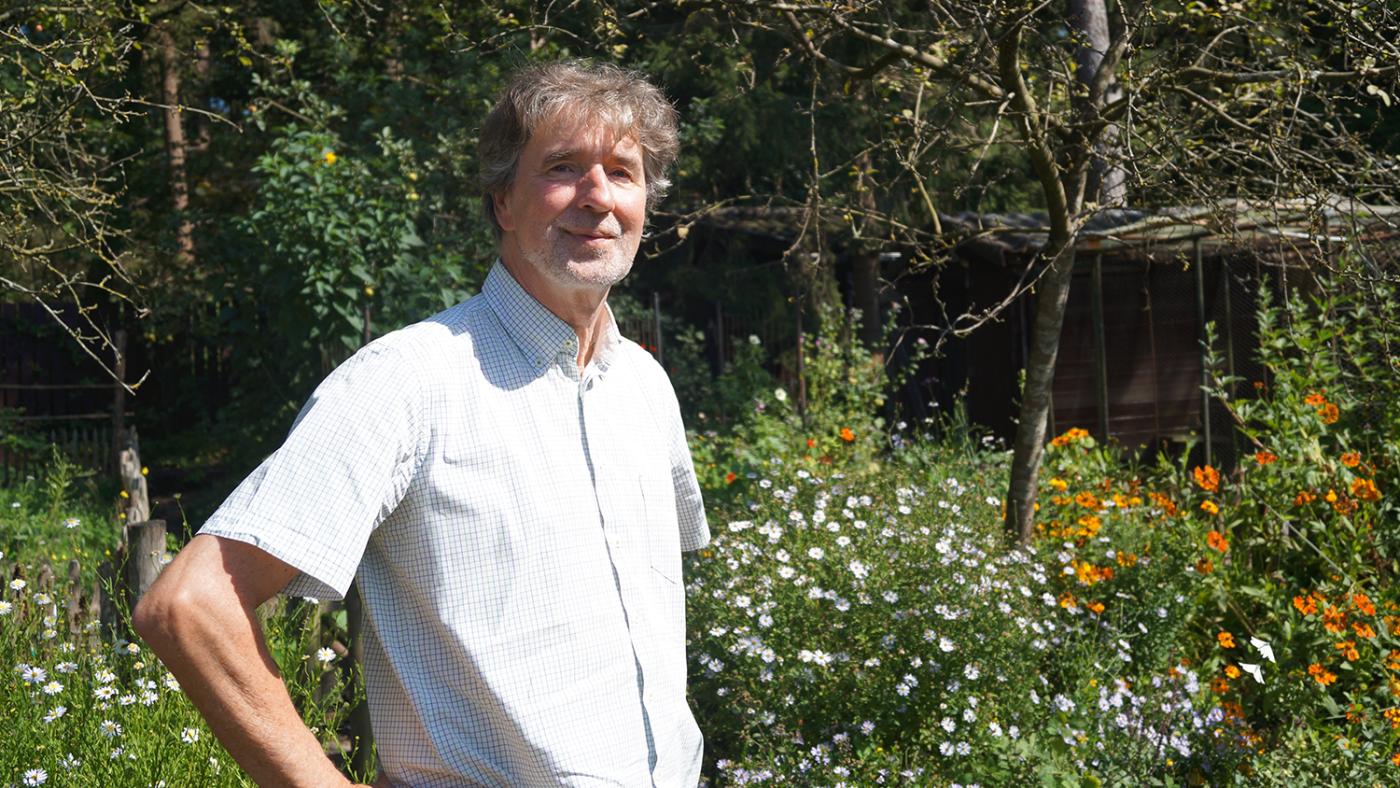Leading expert on educational law Anton van den Hoeven looks back
‘Current students are the victims of the rules on quick graduation that have gone overboard’

Looking back on his college years, Anton van den Hoeven sees major differences with the students now. “In the ‘70s and ‘80s, we had the freedom to study for much longer. And then, depending on our parents’ income, we received a grant, that was a gift. Because I was right on track with my studies, I had some time left over, and I used my study grant to travel to India.”
The pace was lower in those days anyway. “We wrote papers by hand. A typewriter was considered a luxury. Now, you always have to be ‘on’ – think of social media. Everything has a purpose, and everyone’s looking at the future. In my time, no one was focused on their careers. There were barely any jobs back then. I hardly know anyone from my time who did something with their History degree.”
Anton van den Hoeven came to Utrecht in 1975 . “I didn’t know what I wanted to do. My courses in secondary school were all science. The only thing I knew for sure was that I didn’t want to do a hard science study programme. I was given assignments in secondary school that made me wonder "What am I supposed to do with this?" For History, at the time, there was a fixed quota for the number of students. I thought: let’s let fate decide.”
He had no idea what he would do with his History degree. At the time, there was a lot of unemployment. “I could do a PhD in Groningen, but I saw it as a way to postpone choosing what I wanted to do. In 1986, I had a chat with a study counsellor who offered me a temporary job in student support." Shortly after, he became a student counsellor. He had to help students who’d gotten into trouble, for instance with their study financing.
That way, Van den Hoeven experienced how the rules of study financing became more and more strict from the 1980s onward. That started even back in 1986 when he started his work. “For twenty years, they’d been talking about a new law for study financing. When I started working, that was just being implemented. The law meant that you could receive no more than six years’ worth of study financing, and if you wanted to study for longer, you’d have to pay for it yourself. That way, it became harder to graduate from applied sciences and then move on to university. But you did get a basic grant for those six years. The law was meant to banish the eternal students. At first, a lot went wrong. The entire Administration Building was full of students who were unable to contact the Information Management Group (as the DUO was called back then, Ed.), or hadn’t received any money.
" In my time, no one was focused on their careers"
“Still, the rules of those days were favourable compared to what students are dealing with now. You only get four years of basic grants, and it’s less money. I feel like there are so many limitations, that it makes you wonder whether it’s necessary. The eternal student hasn’t existed for a long time. Forcing students to graduate on time, is impoverishment to me. Your college years are a time for your people to develop, and you have to have space for things that don’t go right. That doesn’t make them losers; you learn a lot from failure.”
Van den Hoeven calls it a bitter thing that a generation of unlucky students didn’t get any basic grants, but could only take out loans. “Legally, it’s not wrong. A government is allowed to have new insights. But because we’re talking about a generation that was the victim for a short time, and didn’t receive any grants, it is sad.”
When talking about the study delay fines, he shakes his head. “That was already introduced in 2011 for a short while. The pressure on students rose even more. The planned cutbacks had already been calculated by the government, even though it would yield less funds because students would graduate faster, and therefore would have to pay fewer fines. It isn’t clear whether or not the new rule will also apply to students who’ve already started. If that is the case, I can predict that we’ll have lawsuits. It’s legally untenable to have a law like this apply to everyone.”
Van den Hoeven was a study counsellor from 1986 to 2004; after that, he specialised more in educational law. Aside from his position as a study counsellor, he’d studied part-time and graduated with a Bachelor of Law. As a student counsellor, he helped students who had problems with, for instance, the registration period for their study programme, or with study financing. As a legal expert, he looked at national regulations, making sure they were implemented correctly at Utrecht University.
Forcing students to graduate on time, is impoverishment to me.
“With regulations, you always have to look at the underlying principles. What is it that we want to achieve? Is this the right instrument to do so? Are there unintended consequences?” Van den Hoeven explains. He’s developed some flexibility in this regard. “I try to let myself be led by what’s possible, and don’t immediately let myself be limited.”
One example is his approach to the selection procedure for Master’s programmes. All Master’s programmes are selective, which helps limit the influx of students. In Utrecht, the Neuropsychology programme had a limited number of places available, mainly because there weren’t a lot of internship positions. The law says that you’re allowed to set a limited capacity for a Master’s programme. But there really wasn’t a need to limit the other Psychology programmes similarly. “We interpreted the law in such a way that you didn’t necessarily have to limit the influx for all Psychology Master’s programmes. You look at what the law was meant to do, and whether it’s defensible.”
“Administrators for other universities came to us to ask how we did this. Their legal experts said that according to the law, you had to apply the same rules for all Master’s programmes of the same study programme. But that wasn’t the case.”

Photo: DUB
When the law was created, the issue of international students didn’t exist. So the law applied to everyone, and the university had to allow everyone with a diploma to enrol
Another example in which Van den Hoeven became the centre of a national discussion was about the influx of international students. The law states that everyone who has a valid degree should be allowed to enrol in a study programme. “When the law was created, politicians worked from the idea that everyone should be able to study what they wanted. And if there weren’t enough lecturers, it was up to the programme to fix that. That is no longer the case. Programs may set an enrolment cap for the number of students they can handle. Often internships or coships play an important role, such as in Medicine, Veterinary Medicine or Psychology. In Medicine, the needs of the labour market also play a role in the background.
“When the law was created, the issue of international students didn’t exist. So the law applied to everyone, and the university had to allow everyone with a diploma to enrol. You weren’t allowed to say that for this or that programme, Dutch students would be welcome but international ones weren’t. That became more and more of an issue. We came up with a variant where you could set up two tracks within a program: one in Dutch and one in English. For the English track, we would then set a capacity limitation and selection. This would allow Dutch students to follow the program freely, while you could regulate the influx of international students who wanted to do the English track. When we came up with that proposal, there was a lot of discussion about that. Now, many of those recommendations have been adopted in Robbert Dijkgraaf's recent bill on internationalization. As of September of this year, tracks have the formal ability to set a capacity limitation that way.”
Van den Hoeven thinks education should be accessible. And that you have to think very carefully about whether the rules in the law truly help to achieve the goal you’re after. “I think we have to look more at research. If I design the binding study advice this way, what’s the effect? You can study that.”
The same is true for selection. “Many programmes struggle with how best to select students. The group that gets in isn’t representative. In Medicine, for instance, there are a lot more women than men, and overwhelmingly from a certain social background to boot. How do you change that? A motivation letter can be written by parents. And boys often say, as motivation, “I like the study programme”, while girls present a bullet-proof story. Should you then choose a lottery system to make the programme more accessible? I think it’s good that UU has a Learning Community where insights and research around this theme are being shared and discussed. Based on that, we can change the rules.”
One hot topic from the past few years is the regulation of students with disabilities. "The law prescribes that we have to treat everyone the same. But the law doesn’t define disability or functional impairment, or an overview of the facilities that should be offered. To accommodate the many questions we receive about this from study advisors, we’ve created a sort of handbook, with a checklist that you can use to see if someone has a right to support. In the end, it’s up to the study advisor to make a decision. Even though we strive to achieve a uniform policy, we calibrate as much as possible. The handbook also gives examples of facilities that we should provide, based on jurisdiction."
Legal work isn’t boring, and you can achieve a lot of positive things.
“One example of this is the regulation of the binding study advice for people with disabilities. Common practice was that a student would first just have to try to obtain the 45 credits of the binding study advice in their first year, and then after that, we’d assess whether or not that student has a right to an exception. It would make a lot of sense that if students say beforehand: ‘I will never be able to obtain those 45 credits, given my disability’, then they will also hear beforehand what scaled-down requirements will apply to them. But that wasn’t done within the university. There was an employee who told his boss that given his disability, he wouldn’t be able to work 100 percent. He asked for an adjustment to the requirements. The judge approved it. You can effortlessly mirror this case to students having to obtain enough credits for the binding study advice. So now, we need adjusted agreements.”
Van den Hoeven is now leaving the uni. During his farewell drinks, people lamented: "What do we do now? He is the undisputed expert in this area". Van den Hoeven himself thinks that isn’t quite true, and others will take over his tasks. The wisdom he passes on to his successor is that legal work isn’t boring, and you can achieve a lot of positive things. He’s a legal expert with an ideological perspective. “You can help people by broadly interpreting the rules, keeping an eye on what you want to achieve and whether it’s defensible. You’ll have to be able to explain it to De Telegraaf newspaper and defend it in front of a judge. If you can do that, a lot is possible.”